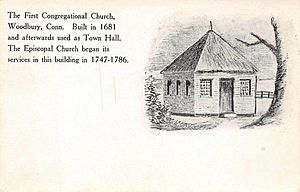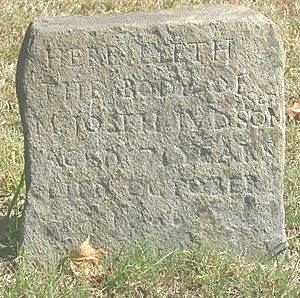Joseph Judson facts for kids
Quick facts for kids
Lieut. Joseph Judson
|
|
|---|---|
| Deputy in the Connecticut General Court (now the General Assembly) | |
| In office 13 half-year terms between 1659 and 1667 |
|
| Constituency | Town of Stratford |
| In office 5 half-year terms between 1684 and 1686 |
|
| Constituency | Town of Woodbury |
| Personal details | |
| Born | c. 1619 Kirkbymoorside, Yorkshire, England |
| Died | October 8, 1690 Stratford, Connecticut |
| Resting place | Old Congregational Burying Ground, Stratford, Connecticut |
| Spouse | Sarah Porter |
| Children | 11 |
| Parents |
|
| Residences |
|
| Occupation | Farm owner, politician |
| Known for | Co-founder of Woodbury, Connecticut |
| Signature | |
| Military service | |
| Force | Connecticut militias |
| Rank | Lieutenant |
| Unit | Stratford Trainband, Woodbury Trainband, Fairfield county militia |
| Conflict | King Philip's War (1675-1678) |
Joseph Judson (born around 1619 – died October 8, 1690) was an important early settler in New England. He is most famous for helping to start the town of Woodbury, Connecticut.
When Joseph was a teenager, his family moved from England to Concord, in the Massachusetts Bay Colony, around 1634. About five years later, they were among the first people to settle in Stratford, Connecticut Colony. Later, in 1672, he left Stratford to help create Woodbury. This move happened because of disagreements about church rules.
Judson was chosen to represent both Stratford and Woodbury in the Connecticut legislature. He was a lieutenant in the local militias of both towns. He also served in the Fairfield County militia during King Philip's War.
Contents
Early Life and Family
Joseph Judson was born around 1619 in Kirkbymoorside, Yorkshire, England. His parents were William Judson and Grace. In 1634, when he was about 15, Joseph moved with his parents and two younger brothers, Jeremiah and Joshua, from England to the Massachusetts Bay Colony. The Judson family lived in Concord before moving to the Connecticut Colony about five years later.
Joseph Judson married Sarah Porter (1624-1696) on October 24, 1644. They were married in Windsor, Connecticut Colony. Sarah was the daughter of John Porter and Rosanna White. Joseph and Sarah had eleven children together.
Life in Stratford, Connecticut
Settling in Stratford
The Judson family was part of the first group of settlers in Stratford, Connecticut Colony, in 1639. The area was first called Pequannock, then Cupheag in 1640, and finally Stratford in 1643.
Soon after they arrived, Joseph's father built the first house in the settlement. About 20 years later, Joseph Judson took over the house. This happened after his father moved from Stratford to New Haven. By 1658, Joseph Judson owned a farm at Mischa Hill. This area is now part of the Nichols Farms Historic District in Trumbull, Connecticut.
Public Service in Stratford
Joseph Judson became a "freeman" of Stratford in 1658. This meant he had the right to vote and hold public office.
As Stratford grew, Judson was given the job of buying more land from Native Americans for the town. In 1661, he talked with leaders of the Paugussett people. He bought a large area of land north of Stratford called the Mohegan Hills Purchase. In 1662, he bought another area west of Stratford called the Long Hill Purchase from the Paugussetts.
Judson was elected as a deputy, or town representative, to the Connecticut General Court. This was like the state legislature back then. He served 13 half-year terms between 1659 and 1667. By 1663, he was an ensign in the Stratford militia. He was promoted to lieutenant in the First Company of the Stratford Trainband when it was formed in 1672.
Religious Differences
A disagreement about religion happened in Stratford. Some people were strict Puritans, led by Reverend Adam Blakeman. They believed only people who had a special religious experience could be full church members. Also, only children of full members could be baptized.
A smaller group, including Joseph Judson, did not agree with these strict rules. Judson had many public discussions about church matters. He wrote letters, spoke at town meetings, and sent requests to the General Court.
In 1669, the General Court allowed a new rule called the Half-Way Covenant. This rule made it easier for people to be baptized. Even with this change, the group that disagreed with the strict rules started their own church in 1670. It was called the Second Church of Stratford.
Founding Woodbury, Connecticut
Starting a New Town
The disagreements between the two churches in Stratford led to a big decision. In 1672, the Connecticut General Court gave permission to Joseph Judson and three other men to start a new settlement. This new place was about 50 miles north of Stratford, at a spot called Pomperaug.
The court said they could start a plantation there. They had to make sure it didn't interfere with any other land grants. Also, other honest people from Stratford could join them. They needed to settle there within three years.
Judson and the other founders wrote an agreement for the settlers in 1672. It was called the "Fundamental Articles agreed upon in order to ye settlement of a plantation at Pomparague." Seventeen original settlers approved this document in 1673. It had rules about land, town money, support for ministers, and land for a school. It also said everyone had to follow "Ecclesiastical Gouerment," meaning church rules.
In 1673, Joseph Judson, Samuel Sherman, and John Minor bought the first piece of land for the town. They bought it from the leaders of the Potatuck tribe, who were part of the Paugussett people. This land deal was known as the "First Purchase."
The First Church of Woodbury was started in 1673. Reverend Zachariah Walker became its minister. He also spent some time at the Second Church of Stratford. The building for the First Church of Woodbury was finished in 1681.
The Pomperaug settlement was officially named Woodbury in 1674. The General Court approved the town's official document in 1686. This early town, including the First Purchase and three more land purchases, is now called Ancient Woodbury. Today, it includes the towns of Woodbury, Roxbury, Southbury, Bethlehem, and parts of Middlebury, Oxford, and Washington.
Public Service in Woodbury
Joseph Judson and John Minor were the first deputies to represent Woodbury in the colony's legislature. They were elected in May 1684. Judson served five more half-year terms between 1684 and 1686. He also worked as a colonial commissioner (a type of judge) for five terms from 1684 to 1689.
He was chosen for committees to help set town boundaries. In 1675, he surveyed the lands of Derby, Woodbury, Mattatuck, Pootatuck, and Wyantenock. In 1678, he surveyed lands between Milford and Derby. In 1680, he was on a committee that set the boundaries for Woodbury, Derby, and Mattatuck.
During King Philip's War (1675–1678), Judson was considered for a promotion to captain of the Fairfield County Troop in 1676. He became a lieutenant in the Woodbury Trainband in 1684.
Death and Legacy
Joseph Judson died on October 8, 1690. His wife Sarah died on March 16, 1696, in Woodbury. They are buried in the Stratford Congregational Burying Ground. A newer monument for Sarah and Joseph Judson was put up in 1812.
The place where his family home stood in Stratford is now on the National Register of Historic Places. His father, William, built the first stone house there around 1639. In 1723, Joseph's grandson, David Judson, built a new wooden house on the same foundation. This house, called the Captain David Judson House, is now a museum in the Stratford Center Historic District.
Judson Avenue (which used to be Judson Lane) in Woodbury is named after Joseph Judson.
Images for kids
 | William L. Dawson |
 | W. E. B. Du Bois |
 | Harry Belafonte |



